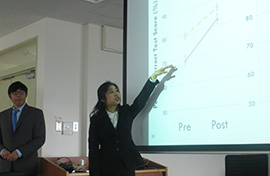
Jessica Huang ’14 and Michael Manansala ’14 presented their research at Kobe University in Japan and also had time for some independent travel.
Over spring break, Jessica Huang ’14 and Michael Manansala ’14 put the capstone on a research project that they’ve been working on for much of their Colgate careers. Traveling to Kansai, Japan, the seniors presented their research titled “Does observing or producing different types of hand gestures help second-language auditory learning of Japanese short and long vowels?”
 They presented at the Phonological Association in Kansai conference at Kobe University in front of an audience of leading scholars from Japan. Huang and Manansala were accompanied by professors Yukari Hirata and Spencer Kelly, who have been advising them.
They presented at the Phonological Association in Kansai conference at Kobe University in front of an audience of leading scholars from Japan. Huang and Manansala were accompanied by professors Yukari Hirata and Spencer Kelly, who have been advising them.
The project, which was supported by a National Science Foundation grant, was an interdisciplinary study involving the fields of Japanese language learning and psychology/neuroscience.
The researchers studied whether visual cues help people learn Japanese — specifically, whether the use of hand gestures helps to distinguish vowel lengths, which change the meaning of Japanese words. According to past studies, English speakers, in particular, have found learning Japanese difficult because they are not used to vowel lengths affecting the meaning of words.
“[We] compared two different types of hand gestures to see which type would teach native English speakers to better distinguish the vowel lengths in Japanese,” explained Manansala, a molecular biology and Japanese double major from Dumont, N.J. “We also tested whether actually doing the gestures while learning, or just watching would be better for learning.”
The team included two other students, April Bailey ’14 and Kristen Weiner ’14, and they have recruited Colgate students to participate in the study for the past three years, ultimately enlisting 88 students. Huang and Manansala also utilized high-end computer software and technology to measure participants’ brain wave responses.
Ultimately, the results of the study showed that there was no direct relationship between the use of hand gestures and increased learning. According to Hirata, these findings lead to an overall question of whether a non-native speaker could ever fully reach the aptitude for the Japanese language (or any language) that a native speaker has.
While the research project started in 2006 (funded by Colgate’s Picker Interdisciplinary Science Institute) with a group of students working under Hirata and Kelly, Huang and Manansala joined in during their sophomore year. Huang and Manansala have incorporated their research into their senior thesis papers.
“Dr. Kelly and I really wanted our students to see not only the technical aspects, but also the bigger picture of how you do research,” Hirata said. “Now, they’re not just doing what we told them to do, but they also take time to digest information, and they’ve developed an understanding of this project as a whole.”
“The professors made us feel like we were a vital part of the project,” said Huang, a Japanese and philosophy double major from Ridgewood, N.J. “So, it was our responsibility to do well, but we also felt like we wanted to contribute as much as possible. We formed a nice team.”
Hirata and Kelly are writing three full-length manuscripts on their findings, which are coauthored by Huang and Manansala.
“It’s been a fun process starting as sophomores and not really being sure what would happen with this,” reflected Manansala. “Now, as seniors, being able to present it has been a really rewarding experience.”
